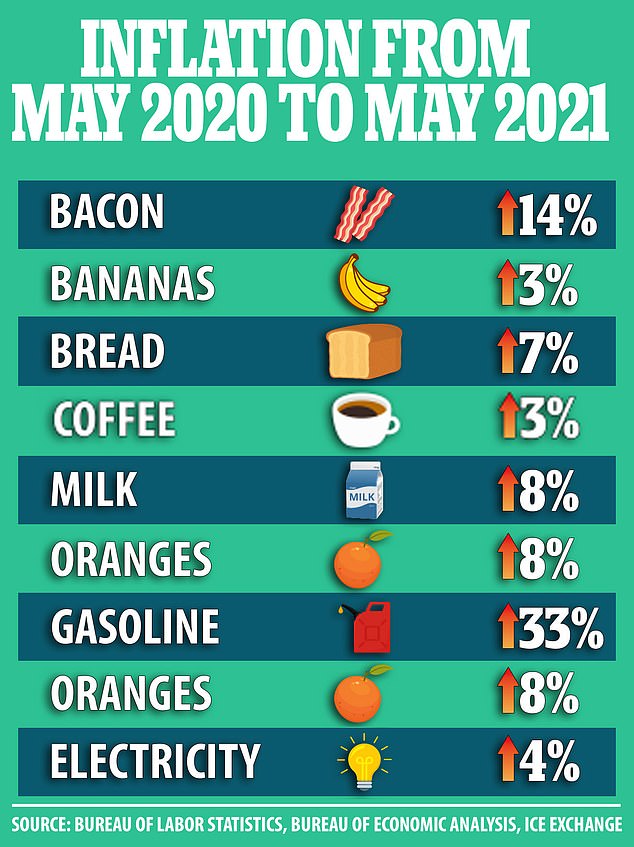Supermarkets have begun stockpiling food as inflation is projected to rise to its highest level in 13 years and worsen.
Retailers are now buying up to 25 percent more supplies than usual, ahead of the expected rise.
According to recent USDA data, the consumer price index for food purchases in grocery stores and supermarkets in May rose 0.7% compared to May last year.
Bacon is 14% higher and milk and oranges are 8% higher, affecting the staple foods of many households.
David Smith, CEO of Associated Wholesale Grocers, the largest wholesaler in the United States, told The Wall Street Journal that he buys 15-20% more products, especially packaged foods with long shelf lives.
“We are buying a lot. Our inventory has increased significantly over the same period last year,” Smith said.
At Spartan Nash, Michigan, retailers bought about 20 to 25 percent more than usual, including frozen meat.
CEO Tony Sarsam said the “unique inflationary period” caused the “feeding frenzy.”
Some retailers, including Ahold Delhaize USA, are expanding their warehouse space to accommodate more products.
Ahold Delhaize USA, which operates the Food Lion and Stop & Shop chains, has increased its inventory of paper and cleaning products by 20%.
The recent rise in prices and the need for stockpiles arise because several factors are pushing costs all the way from farm to store.
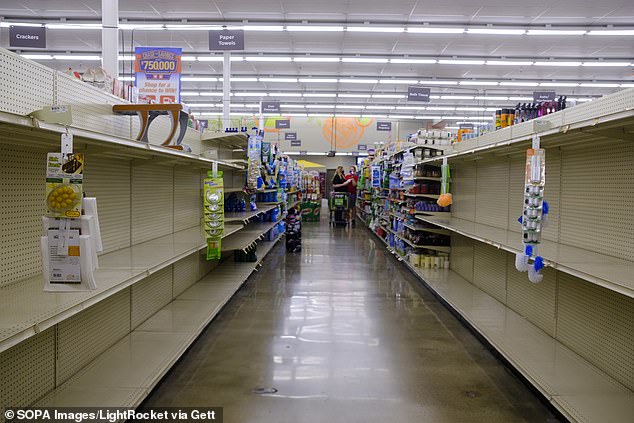
Supermarkets have begun stockpiling food to protect their profits as supply chain costs rise, consumer spending rises and inflation rises to its highest level in 13 years.Empty shelves in Savemart as shoppers spent more than this time last year and ran out of shelves
Shoppers are spending more on groceries, and according to data from Jeffreys and Nielsen IQ, the U.S. for the week to June 19, 2021, compared to the same week in 2019 before the pandemic. Grocery sales increased by 15%.
Sales also increased by 0.5 percent compared to this time last year, when fear of the virus plunged shoppers into a frenzy of panic buying.
This increase in sales has exhausted supermarket shelves and forced stores to increase inventories to keep up with demand.
In addition, concerns about continued rising food prices have forced retailers to stockpile.
Supply chain problems are pushing up prices and labor shortages are putting wage pressure on the food sector.
Transportation costs are also rising, with gas prices in May rising 56% from a year ago.
On Friday, the AAA gas price index rose from $ 2.171 a year ago to $ 3.086, fixing the national average gas price.
As a result, several companies, such as cereal makers General Mills, Hormel Foods, and Kimberly-Clark, have started or will do so.
“The inflationary pressures we see are significant,” General Mills CEO Jeff Harmening said at a recent investor conference.
“It’s probably higher than we’ve seen in the last decade.”
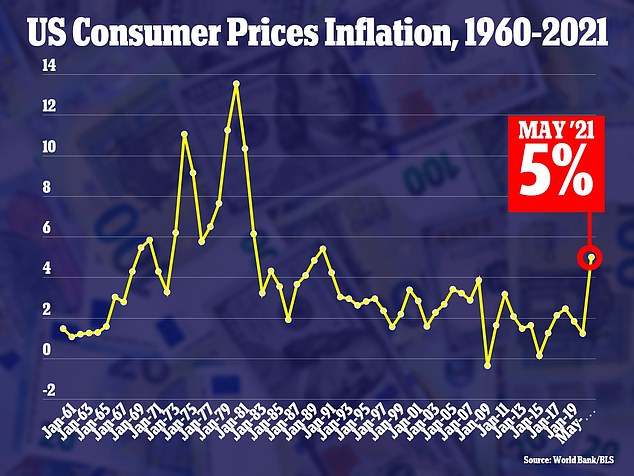
The consumer price index has risen at the fastest pace since 2008, rising 5% in May compared to the same period last year.
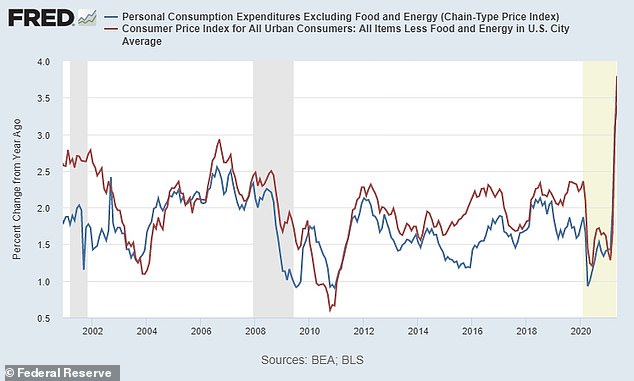
Two indicators of inflation, the PCE index (blue) and the consumer price index (red), can be seen above.
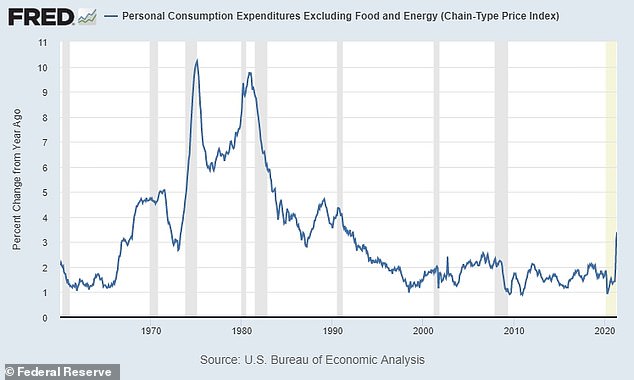
The core Consumer Expenditure (PCE) price index, excluding volatile food and energy, dates back to 1965. This is the Fed’s recommended inflation indicator.
The company, which manufactures cereals such as Honeynut Cheerios, Lucky Charms and Trix, said it is considering raising the price of its products as ingredients such as grains and sugar have become more expensive.
Hormel Foods has already raised prices for Skippy Peanut Butter, and Coca-Cola says it expects to raise prices to offset rising costs.
Kimberly-Clark, which manufactures Kleenex and Scott toilet paper, said it would raise the price of its products by about 60 percent. Proctor & Gamble has announced that it will raise prices for baby, feminine and adult care products.
This means that supermarkets are being forced to bombard further to buy goods from these suppliers.
Soaring inflation is another factor.
Consumer prices soared faster than expected in May as the economy recovered faster than expected from the COVID-19 pandemic.
Overall consumer prices rose 0.6% and annual inflation was 5%. This is the highest level since August 2008.
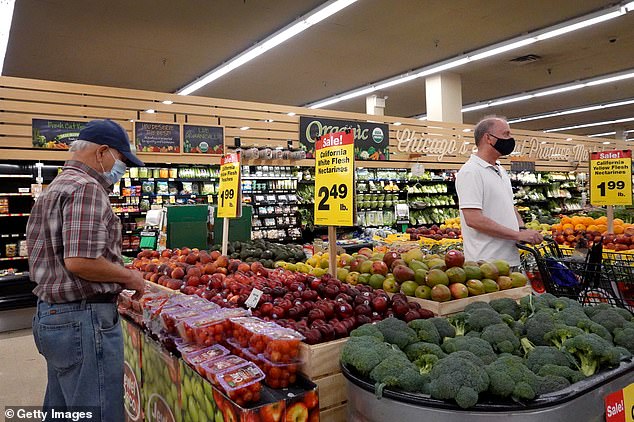
As grocery sales grow, customers buy produce at a Chicago supermarket in June.
In June, the Federal Reserve Board said it might need to raise interest rates faster than expected to prevent inflation from running wild.
Federal Reserve Board Chair Jerome Powell said authorities expect interest rates to rise from nearly zero to 0.6 percent by the end of 2023.
Back in March, the central bank said it didn’t expect to raise it until at least 2024.
According to the journal, rising inflation is reflected in rising food costs.
With fears of further inflation, retailers stock up on inventories before they rise.
However, stockpiles are also part of the problem, creating shortages and further pushing up prices.
Some retailers told the journal that they received only about 80% of their orders from suppliers because their major products were gone.
US supermarkets stockpile up to 20% more supplies as inflation is projected to worsen.
Source link US supermarkets stockpile up to 20% more supplies as inflation is projected to worsen.


